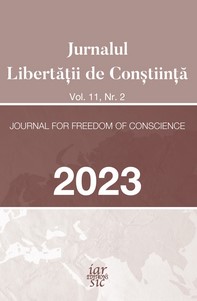DREPTUL CONFESIUNILOR RELIGIOASE DIN ITALIA, „DIFERITE DE CEA CATOLICĂ”, LA LIBERTATEA DE RELIGIE
THE RIGHT OF RELIGIOUS CONFESSIONS IN ITALY, „DIFFERENT FROM THE CATHOLIC ONE”, TO FREEDOM OF RELIGION
Author(s): Nicolae V. DuraSubject(s): Christian Theology and Religion, International Law, Human Rights and Humanitarian Law, Politics and law, Sociology of Religion
Published by: Editions IARSIC
Keywords: freedom of religion; religious Cult; general regime of the Cults; international legislation;
Summary/Abstract: In Italy there is still no general law on religious freedom and the general regime of the Cults, i.e. a law on „recognised” Cults, hence the fact that each denomination or religious Cult must conclude an agreement with the State in order for the State to recognise its right to freedom of Religion. However, from the pages of this study, the reader can learn how freedom of Religion has been provided for both in the texts of the Agreements concluded between the Italian State and Religious Denominations, „other than the Catholic one” (Art. 7 (1) of the Constitution of the Italian Republic), and in the texts of some Laws enacted on the basis of the provisions of principle set out in the text of this Constitution. A hermeneutical analysis of the text of these Agreements and Laws has allowed us to note that, roughly speaking, their ideational and lexical content is similar, which shows that the Italian legislator wished to ensure and guarantee to every Confession or religious Cult - other than the Roman Catholic one, whose legal status was established by the Lateran Pacts - with some modifications and repeals of the texts that came about through the 1984 Villa Madama Pacts - a status of equality before the law and the right to organise themselves according to their own statutes, provided that these do not contravene ‘Italian law’ (cf. Art. 8 of the Constitution of the Italian Republic). Religious denominations or Cults other than the Catholic one therefore en-joys - regardless of their age, number, or religious creed - the right to freedom of religion, equality before the law and autonomy. The constant concern of the Italian legislator to make express reference to the text of international legislation on fundamental human rights and freedoms, among which freedom of religion occupies a prominent place, is of course conclusive proof that he wished and succeeded in giving other religious denominations - other than the Roman Catholic Church - a legal status which does not infringe their right to religious freedom.
Journal: Jurnalul Libertății de Conștiință
- Issue Year: 11/2023
- Issue No: 2
- Page Range: 53-86
- Page Count: 34
- Language: Romanian

